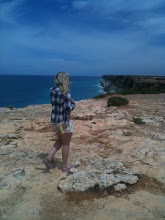I found this semester filming our own news stories a
fantastic opportunity to put into practice the skills I had acquired from
previous University units such as editing sound and image. I found it a lot
more comforting knowing that I would be using cameras in a manner that was more
beneficial to my course (as we were filming news stories) and I believed I had
more expertise in as opposed to making short films.
Although it had been a long time since I was last behind a
camera I found it useful that in lectures and tutorials we were given the
opportunity to brush up once again on our skills and have assistance in
tutorials by professional camera operators.
Through these teachings I added to my skills and was able to
relate them more to broadcast journalism. When shooting media short films for
assignments it was not necessary to take steps such as practice shooting
beforehand as scenes were always scripted and could be shot again and again if
I was unhappy with something.
I feel that because of these brush up lessons we were able
to set up the camera quickly and effectively and also program the camera to get
the most natural looking shot possible!
I found that the difference with shooting for journalism
purposes and when I did it for media is that journalism is a lot less
manufactured, if you start directing the scene then you ruin the authenticity
of the shot.
It is also unprofessional to ask the talent to interview
again or repeat certain bits of the interview if say I got the lighting wrong
or the microphone was in the wrong position.
During the filming of Jeremy Lasek, I made the mistake of
not watching the cloud cover go over the sun and half our interview was in a
darker light, next time I use a camera I will be more vigilant in what is going
on around me and adjust the settings when these types of variables occur.
In some situations however, it is a possibility to be able
to shoot scenes over and over again such as the piece to camera, in which we
were lucky we played back our footage as the script was fluttering around in
the wind and drowning out the audio of Alana speaking.
Other shots can also be re rerecorded thankfully! When you
aren’t interviewing or needing to capture an important event of course! It is
important to get an array of shots even if you don’t use half of them.
I learned that in
journalism when working with cameras it is always important to be at the ready
because anything could happen, this is where borrowing cameras before filming
assignments came into use as I could practise and feel confident using the camera
to an intermediate level including using the camera in manual mode to have more
control over the settings.
I found I already knew a lot about camera terminology
including those to do with types of camera shots such as panning, wide shots
and close up and how to get effective shots when I was filming the shots of
Canberra tourism destinations I felt we got a really effective shot by standing
on Lake Burley Griffin and doing a pan shot of the area from the High court to
Parliament house.
This website tutorial was very useful in learning the
different terms I was unsure about http://www.mediacollege.com/video/camera/tutorial/01-terminology.html
I also felt comforted in that we were assigned a partner in
our first assignment where we would use cameras as we could use a combined
knowledge of what we knew about how to operate the camera.

No comments:
Post a Comment